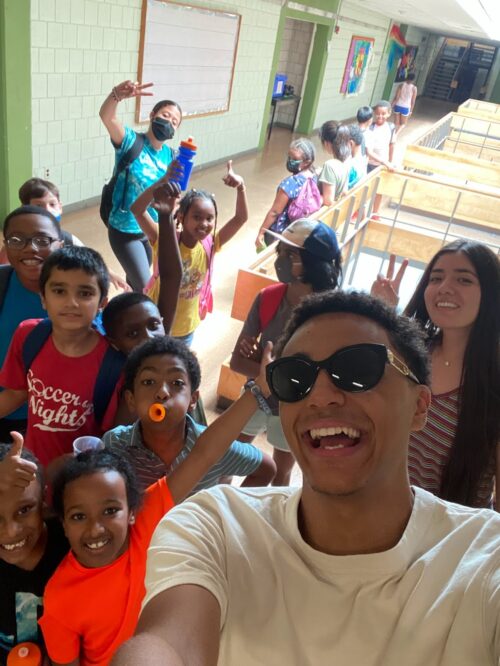Three summers spent in the Cambridge sun, chasing kids on the playground, teaching chemistry, running through sprinklers, peering into museum cases, dancing with parents, serving food, sitting quietly, directing loudly. Three summers spent working at the Phillips Brooks House Association (PBHA) Summer Urban Program. The best three summers of my life.
***
It’s a classic PBHA proverb: SUP is the hardest summer you’ll ever love. Let me tell you about the hard part. As a director, your day might start relatively late (let’s say 7 a.m.). You’ll catch the bus down Cambridge Street at 7:40, rolling up to the site by eight. Your first task is to prepare attendance sheets as counselors set up their classrooms. At 8:30, they begin to arrive. Children. Energetic, curious, and insatiable. They’ll be your responsibility for eight hours, their parents entrusting you with the heavy privilege of guarding their lives. Moms and grandfathers and sisters, after waving goodbye to their loved ones, give you a nod that is both reassuring and intimidating; a nod that says, “You got this. Now don’t mess it up.”
You and your team of college and high school students are in charge. You know all the systems and procedures, from the order of lunch breaks to the approval of the curriculum, because you designed them. If the systems fail (and they probably will, because this is your first time managing a full-time staff), you will answer for the consequences. When others run away, your job is to run toward the emergency. When your team is tired, your job is to be energized—to provide steady encouragement and a tone of professionalism and enthusiasm, even when you yourself are tired and discouraged.
The job of a counselor is no easier. You will be chief counsel to ten or more developing and maturing humans. They will turn to you for guidance as they process deep and complex emotions. They will expect you to have the answers to all their questions, mediate their conflicts with the precision of Justice herself, and act “cool,” even though your essential task is to keep them safe (it goes without saying that coolness and safety don’t always align, especially in the eyes of elementary schoolers in summer mode). You will negotiate for their attention every step of the way, battling against the temptations of phones and swing sets just visible through the classroom window.
A few of your campers will lack respect for themselves and others. You will insist on kindness, responding to meanness with compassion and the gentle hand of a teacher. Some might run when they should walk, talk when they should listen, and play when they should focus—you will respond with relentless patience and a belief in their capacity to succeed. You will try your best and come out short. Sometimes you’ll feel like giving up. Some do give up.
So why do you love it? Why do you return for two more summers and write an op-ed encouraging your peers to go for it? Maybe for practical reasons: you realize that your service as a guardian made a tangible difference. That each hour of camp is an hour for parents to work or rest or plan for the future. In my first summer, a parent of two campers used the time to navigate the Cambridge affordable housing process. I was a reference on her housing application. She has now successfully moved to Cambridge.
Perhaps you realize that camp is the site of crucial emotional and intellectual stimulation for young people vulnerable to summer learning loss, the decline in academic and social preparedness that comes with sitting at home instead of gaining new experiences. Learning loss becomes learning inequity when only high-income households can access programs. SUP is incredibly affordable, often one-tenth the cost of neighboring initiatives, and readily waives camp fees for anyone unable to pay. That affordability is made possible by the student staffing model. It is made possible by your commitment and sacrifice.
Maybe you love it because you forged profoundly deep relationships with your campers and colleagues. With every conversation about respect, early morning van ride to the site, bandaged knee scrape, lunchtime game-winning three-pointer, and venting session in the dining hall, you grew closer to the special people around you. People committed to the wellbeing of their community and kids excited by the simple things in life: tag, water balloons, friendship bracelets, Takis. You love it because you had fun; you enjoyed letting your inner child leap around the playset and devour bubblegum ice cream.
Maybe you love it for the same reason I did: because you’re up for the challenge. You’re ready for a level of responsibility that you likely won’t be granted again until you’re 30. President John F. Kennedy ’40 said that we went to the moon not because it was easy, but because it was hard. SUP is hard. Really hard. And that’s what makes it an incredible experience. You will grow immensely as a human being. The people you meet will be the best of the best. Your community will thank you. So, dear reader, take the leap into service. Join us on the moon.
The Phillips Brooks House Association, located in Harvard Yard, is the hub for public service at Harvard. A student-led organization, PBHA offers over 60 programs to the residents of Cambridge and Boston.
Owen Ebose ’25 (owenebose@college.harvard.edu) is on his way to enjoy some bubblegum-flavored ice cream.

